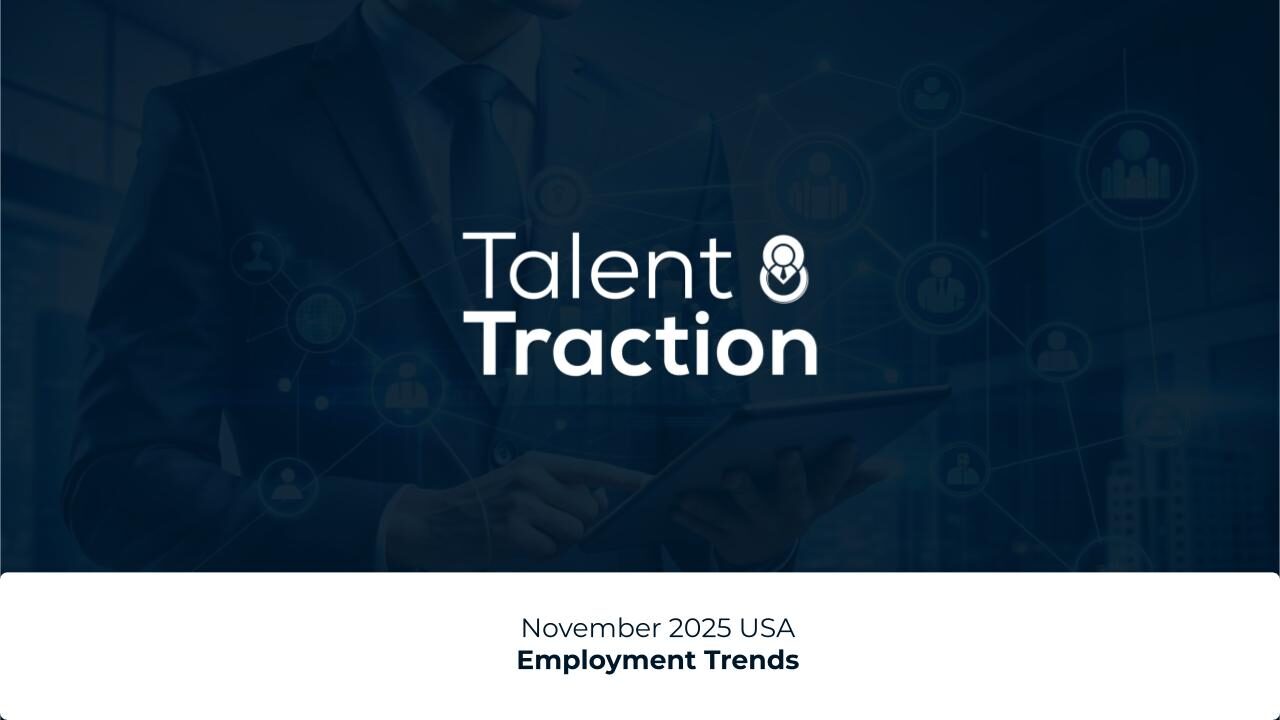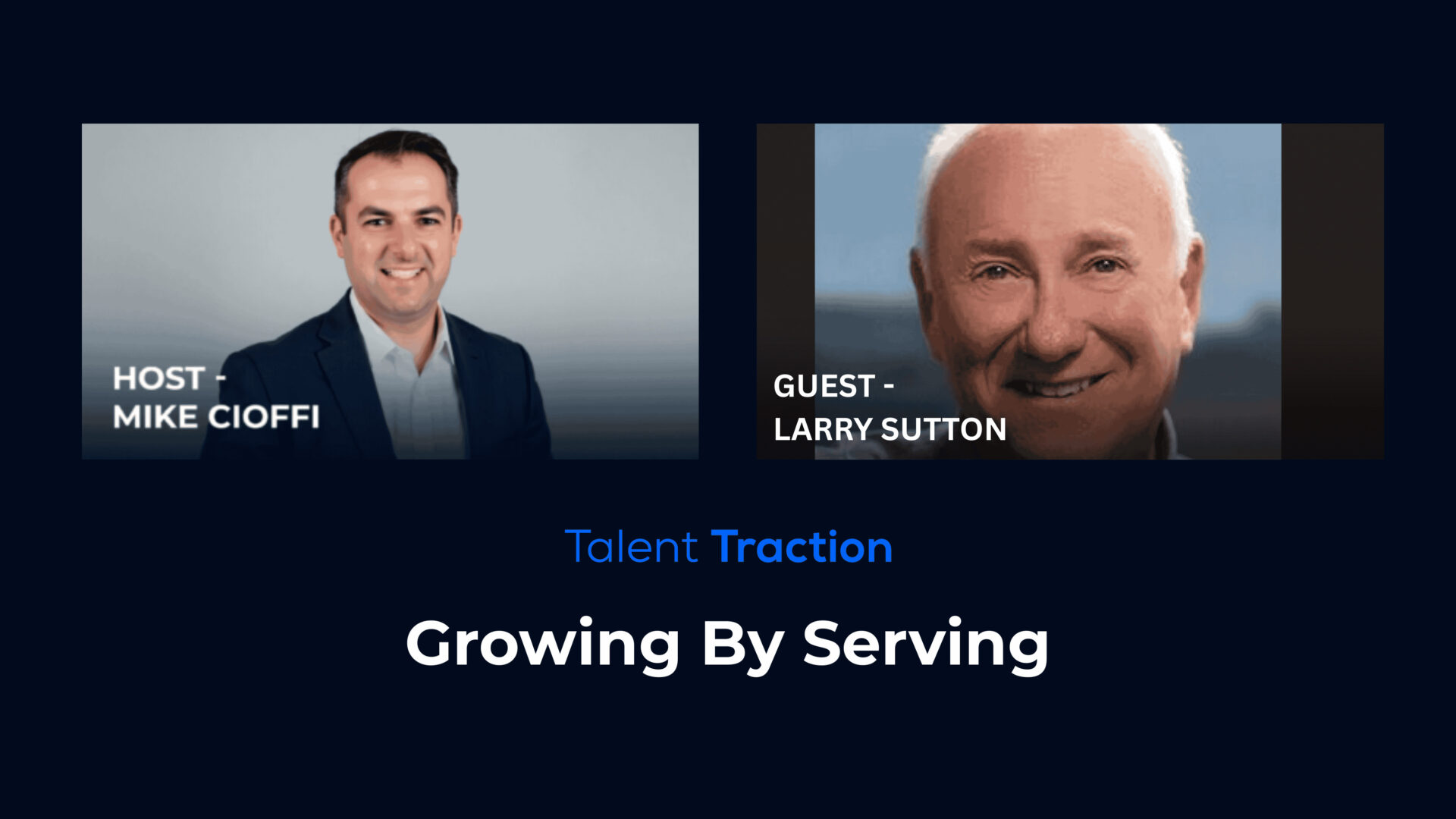If you are in the plastics manufacturing industry and looking for Plastic Manufacturing Recruiters in Texas, this article is for you. Texas is one of the nation’s largest hubs for plastics & rubber products, and partnering with the right recruiter can make all the difference in hiring quality talent efficiently. In this post, you’ll learn:
- The current state of the plastics manufacturing industry in Texas & USA
- Why specialized recruiters matter
- What to look for in a plastic manufacturing recruiter in Texas
- How to evaluate recruiter performance
- Trends & challenges in hiring within plastics manufacturing
- Actionable steps you can take now
Let’s begin.
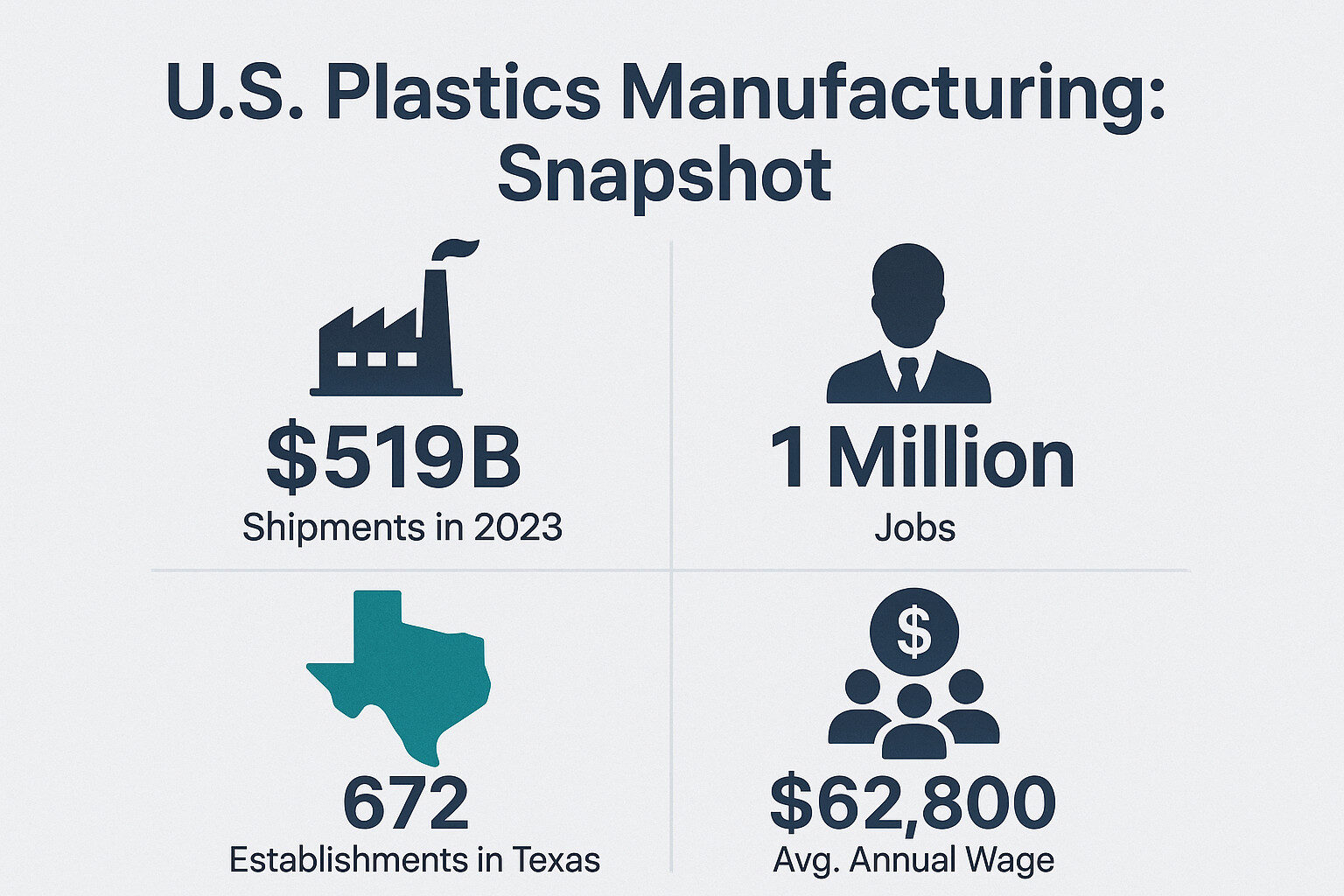
U.S. Plastics Manufacturing: Snapshot & Why Texas Matters
To understand what plastic manufacturing recruiters in Texas need to deliver, you first have to grasp the scale and dynamics of the industry.
- The U.S. plastics & rubber products manufacturing industry generated $519 billion in shipments in 2023 and supports over one million jobs. Texas led employment among all states.
- The total U.S. plastics industry (both “plastics materials & production” and “plastics product manufacturing”) generates around $371 billion in annual revenue.
- The average wage in the plastics product manufacturing sector is about $62,800/year, which is somewhat below the national average across all industries.
- Texas is among the top states in terms of number of establishments in plastics product manufacturing (672 in 2022), second only to California.
What this tells us:
- The industry is large, with many players, and is expanding in many sub-segments (processing, molding, packaging, etc.).
- There is significant competition for skilled talent, especially technical roles (production supervisors, process engineers, moldmakers, etc.).
- Recruiters must understand both the macro trends (policy, sustainability, supply chain, automation) and micro needs (specific skills, local labor markets) to add value.
Why Use Specialized Plastic Manufacturing Recruiters in Texas
Generic recruiters can fill roles, but those working with plastics/manufacturing have specialized needs. Here’s why working with recruiters who know the domain in Texas gives you a competitive edge.
Advantage | What it Means in Practice |
Deep industry knowledge | They understand production lines (injection, blow, thermoforming, extrusion), materials (polyethylene, polypropylene, bioplastics), process control, regulatory standards, safety, etc. |
Vetted & technical candidate pools | Instead of having to train someone from scratch, you get candidates who already have relevant experience. Saves time and reduces risk. |
Broad networks & passive candidates | Many ideal candidates are not actively job-seeking. Good recruiters are tapped into passive talent pools through industry associations, local technical schools, conferences. |
Faster time to fill + reduced hiring cost | Specialized recruiters can pre-screen technically, reducing the number of unfit candidates. That cuts down interviewing time, onboarding issues, turnover risks. |
Local insights | Texas is vast. Labor markets differ between Houston, Dallas-Fort Worth, San Antonio, etc. Knowing local labor availability, wages, apprenticeship programs helps. |
What to Look for in Plastic Manufacturing Recruiters in Texas
If you are deciding between recruiters, here are the qualities and capabilities that matter. Use this as a checklist when evaluating options.
- Technical Knowledge & Industry Credibility
- Experience working specifically in plastics (not just “manufacturing” broadly).
- Understanding of plastics manufacturing technologies (e.g. injection, extrusion, blow molding), materials, sustainability trends, safety standards.
- Credible track record: placements, case studies, references in plastics.
- Geographic Reach & Local Presence
- Texas has many industrial regions. A recruiter familiar with Houston, Dallas, San Antonio, El Paso, etc., can tap into local candidate pools.
- Understanding of regional wage levels, commuter considerations, and local training programs.
- Network Depth & Passive Candidate Access
- Do they have longstanding relationships with industry associations (e.g. plastics trade groups), technical schools, molding shops, etc.?
- Are they able to source candidates who aren’t actively applying but are open to opportunities?
- Speed, Process & Efficiency
- How quickly do they respond to new role requests?
- What is their screening process (technical interviews, skills assessments)?
- How do they present short-lists and what is the quality vs quantity?
- Cultural Fit & Employer Branding
- Do they understand your company’s culture, safety standards, values (e.g. sustainability, innovation)?
- Can they help you sell your company to candidates (e.g. showing career paths, benefits)?
- Cost & Fee Structure
- What is their fee (flat, percentage, retained vs contingent)?
- What guarantees do they offer (e.g. replacement if candidate leaves within X months)?
- Legal / Compliance & Safety Knowledge
- Texas and U.S. regulations (OSHA, environmental, etc.).
- Is the recruiter mindful of safety culture, certifications, and compliance for the roles they fill?
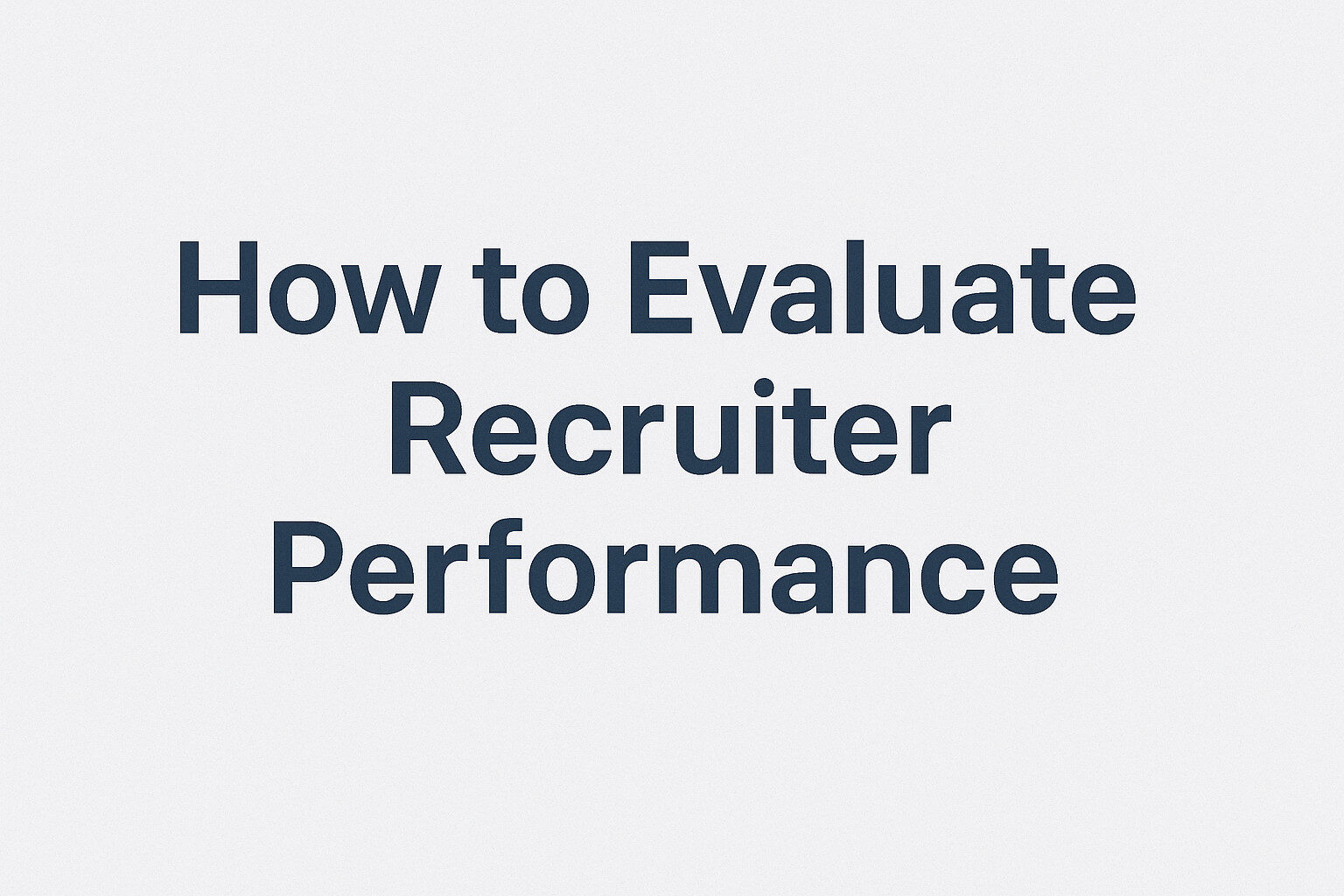
How to Evaluate Recruiter Performance
Once you engage a recruiter, you should track their performance against metrics. Some useful KPIs:
KPI | Why It Matters |
Time-to-Fill | How many days/months from opening the role to offer accepted. A good plastics recruiter will beat the average because they have ready pipelines. |
Quality of Hire | How well does the candidate perform (productivity, defect rates, safety incidents)? You might measure turnover after 3-6 months. |
Fit (skills + culture) | Are technical/environmental/safety skills matched? Does the person adapt to your company culture? |
Retention Rate | If candidates frequently leave or are not successful, recruiter’s screening or candidate assessment may be weak. |
Candidate Feedback | How do candidates rate their recruitment experience (interviews, communications)? This reflects on your brand too. |
Cost per Hire | Total cost (recruiter fees + internal HR time + onboarding) divided by hires. Specialized recruiters aim to lower hidden costs. |
Key Challenges in Hiring for Plastic Manufacturing in Texas
Even with the right recruiter, you’ll likely face challenges. Being aware helps you anticipate and plan.
- Technical skills shortage: Machine operators, mold makers, process engineers with hands-on plastics experience are often in short supply.
- Competition & wage pressure: With many plastics, chemicals, and related industries in Texas (petrochemical, packaging, automotive), competition for employees is intense; wages and incentive packages need to be competitive.
- Automation & robotics: As plants modernize, recruiters must find talent who combine practical hands-on experience with digital/automation capabilities.
- Regulatory & environmental pressure: Increasing demand for sustainable plastics, recycling, ASTM/ISO standards, emissions control. Your new hires may need to be versed in documentation, compliance, and process control.
- Geographic cost & labor variance: Some regions of Texas have higher cost of living, or labor markets saturated; travel and relocation issues can matter.
Data Trends Shaping the Future of Plastics Manufacturing in Texas & U.S.
These trends affect what recruiters (and hiring companies) should focus on:
- Industry Growth & Output
- The U.S. plastics product manufacturing industry is projected to grow by about 5% over ten years in employment, with output growth slightly lower but steady.
- Total industry shipments in the U.S. reached $519 billion in 2023. Texas leads in employment in plastics.
- Wages & Workforce Composition
- Average wage ~$62,800/year in plastics product manufacturing.
- Gender income disparities: male workers tend to earn more than female workers in equivalent roles.
- Geographic Concentration
- Texas has more than 600 plastics product manufacturing establishments. Major clusters are around Houston, Dallas-Fort Worth, and other industrial corridors.
- Sustainability & Regulation Pressure
- Rising investment in recycling and biodegradable materials.
- Environmental scrutiny (tax breaks vs pollution violations) is pushing plants to more compliance.
- Automation & Reskilling
- As plants adopt advanced machinery, robotics, IoT, demand for digitally literate technicians and engineers increases.
How to Find & Evaluate Top Plastic Manufacturing Recruiters in Texas
Here are practical steps to select and work with recruiters effectively so your time & resources are well spent.
- Do Market Research First
- Identify which sub-segment of plastics manufacturing you’re hiring for (e.g. injection molding, packaging, blow molding, recycled plastics).
- Know what the local wage rates are in the Texas region you are operating in.
- Ask for References and Case Studies
- Ask recruiters for examples of placements similar to your role.
- Speak to companies who used them to see satisfaction with candidate quality & turnover.
- Clarify Your Role Profile & Expectations
- What skills/experience are non-negotiable? What can be learned on job?
- What are your safety, environmental, quality standards?
- Agree on Process, Timeframes, Communication
- What are the milestones: short-list, interviews, offers?
- How often will recruiter update you?
- Include Assessments / Technical Screening
- If your role is specialized, require hands-on test, sample problem/problem case, or verify certifications.
- Monitor & Review Performance
- Once hiring begins, track the KPIs above (time to fill, retention, performance).
- Provide feedback to the recruiter so they can adjust.
What a Good Contract or Partnership with a Recruiter Should Include
When you formalize your relationship, ensure the agreement covers things like:
- Clear job descriptions and expectations (roles, responsibilities, safety, environmental compliance)
- Fee or commission structure (contingent vs retained) and payment terms
- Replacement guarantee period (if the hire fails within X months)
- Reporting / communication cadence
- Confidentiality, especially for sensitive or proprietary roles or technology
- Candidate background checks, competency verification, and safety or regulatory checks if required
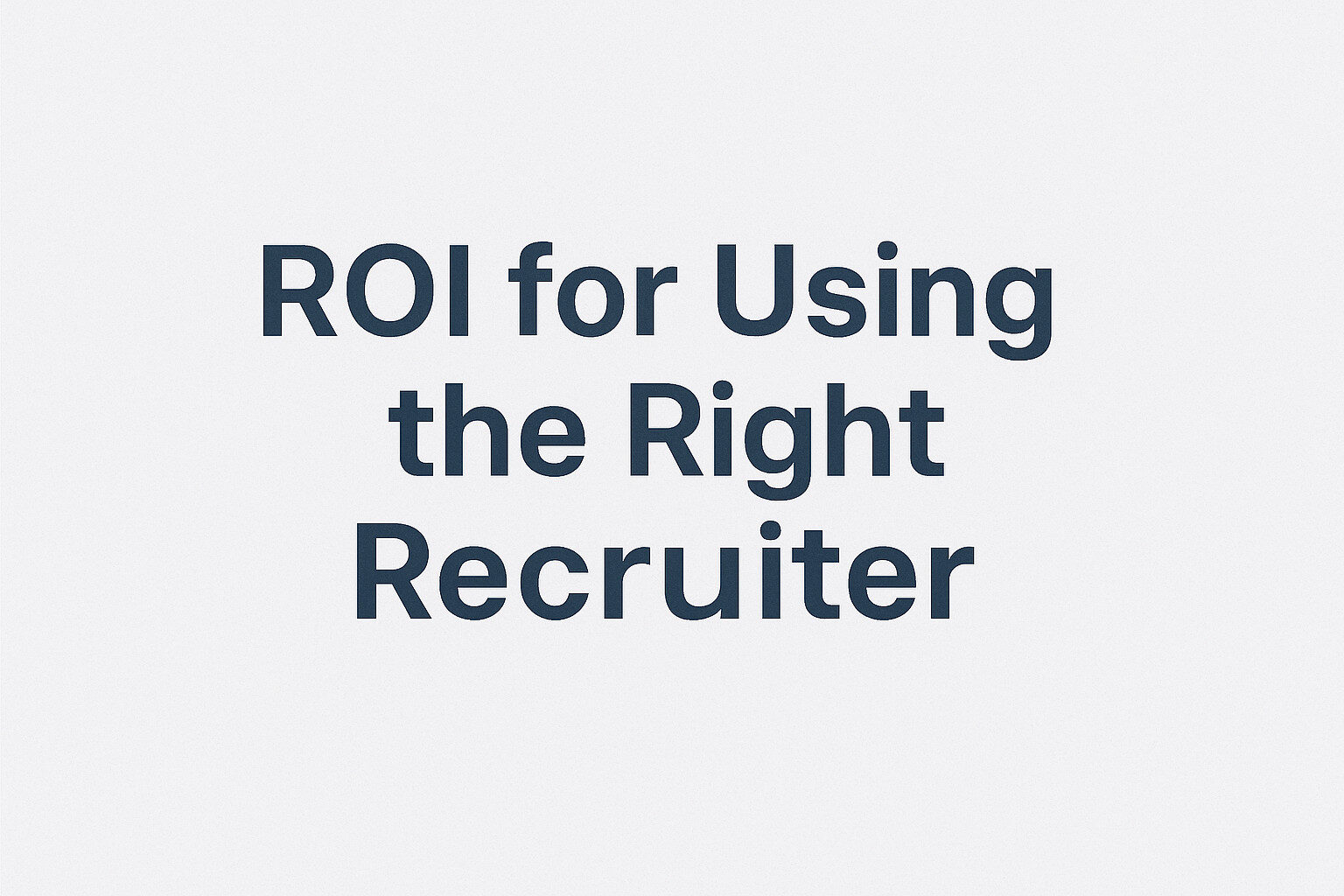
Your Time Value: ROI for Using the Right Recruiter
As someone hiring (either HR leader or plant manager), your time is valuable. Here’s how using a good plastic manufacturing recruiter in Texas protects & enhances your time and investment:
- Reduced hiring cycle → less time spent by management on interviews, less production downtime due to understaffing.
- Better hires up front → less turnover, retraining, quality issues, safety risks.
- Lower hidden costs → fewer overtime costs, fewer delays in production, better throughput.
- Opportunity costs → when you fill critical roles faster, you can take on more business, improve output.
We can try to quantify: Suppose instead of 90 days to fill a technical supervisor role you fill in 45 days; you save management time, reduce error/defect cost, increase production hours etc. Over multiple hires this compounds.
Common Mistakes & How to Avoid Them
- Hiring based solely on cost (lowest fee) and sacrificing quality.
- Not defining role specifications clearly (skills, experience, safety/regulatory expectations).
- Ignoring candidate feedback — poor interview experience leaks into employer reputation.
- Not involving production or technical leads in interviews, so cultural/technical mismatch.
- Relying on one recruiter; sometimes using two or three (but with clear roles) gives you choice.
Why Partner with Talent Traction for Plastic Manufacturing Recruitment in Texas?
At Talent Traction, we specialize in helping companies like yours secure the right talent in plastic manufacturing. Unlike generic staffing firms, we offer a white-glove recruitment service — meaning you get:
- A dedicated recruiter who understands the plastics industry inside out
- Access to carefully vetted candidates (including passive talent not found on job boards)
- Transparent communication and tailored search strategies
- Faster hiring cycles without compromising on quality
- A focus on long-term fit, culture alignment, and retention
We know your time is valuable. Our mission is to ensure every interaction adds measurable value, whether you’re hiring process engineers, plant supervisors, or executive leaders.
👉 Ready to hire the best in Texas plastics manufacturing? Contact Talent Traction today and experience our white-glove recruitment approach that delivers results you can count on.
Final Thoughts & Action Steps
Let me wrap up. If you take nothing else from this, remember: the right plastic manufacturing recruiter in Texas is more than a CV mill. They bring industry insight, candidate networks, speed, and risk-mitigation.
Here are concrete steps you can take right now:
- Make a list of your top 3 plastics-specialized recruiters in Texas. Contact them for initial conversations.
- Define precisely what your “ideal” candidate looks like: skills, experience, safety, sustainability.
- Set up your KPI dashboard for hiring: time-to-fill, retention, quality.
- Talk to peers or other companies in Texas plastics manufacturing about who they’ve used and trusted.
Budget appropriately: often you get what you pay for. Make sure your compensation + environment + brand is compelling.



